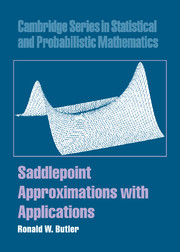Book contents
- Frontmatter
- Contents
- Preface
- 1 Fundamental approximations
- 2 Properties and derivations
- 3 Multivariate densities
- 4 Conditional densities and distribution functions
- 5 Exponential families and tilted distributions
- 6 Further exponential family examples and theory
- 7 Probability computation with p*
- 8 Probabilities with r*-type approximations
- 9 Nuisance parameters
- 10 Sequential saddlepoint applications
- 11 Applications to multivariate testing
- 12 Ratios and roots of estimating equations
- 13 First passage and time to event distributions
- 14 Bootstrapping in the transform domain
- 15 Bayesian applications
- 16 Nonnormal bases
- References
- Index
8 - Probabilities with r*-type approximations
Published online by Cambridge University Press: 25 February 2010
- Frontmatter
- Contents
- Preface
- 1 Fundamental approximations
- 2 Properties and derivations
- 3 Multivariate densities
- 4 Conditional densities and distribution functions
- 5 Exponential families and tilted distributions
- 6 Further exponential family examples and theory
- 7 Probability computation with p*
- 8 Probabilities with r*-type approximations
- 9 Nuisance parameters
- 10 Sequential saddlepoint applications
- 11 Applications to multivariate testing
- 12 Ratios and roots of estimating equations
- 13 First passage and time to event distributions
- 14 Bootstrapping in the transform domain
- 15 Bayesian applications
- 16 Nonnormal bases
- References
- Index
Summary
Approximations to continuous univariate CDFs of MLEs in curved exponential and transformation families have been derived in Barndorff-Nielsen (1986, 1990, 1991) and are often referred to as r * approximations. These approximations, along with their equivalent approximations of the Lugannani and Rice/Skovgaard form, are presented in the next two chapters. Section 8.2 considers the conditional CDF for the MLE of a scalar parameter given appropriate ancillaries. The more complex situation that encompasses a vector nuisance parameter is the subject of chapter 9.
Other approaches to this distribution theory, aimed more toward p-value computation, are also presented in section 8.5. Fraser and Reid (1993, 1995, 2001) and Fraser et al. (1999a) have suggested an approach based on geometrical considerations of the inference problem. In this approach, explicit ancillary expressions are not needed which helps to simplify the computational effort. Along these same lines, Skovgaard (1996) also offers methods forCDF approximation that are quite simple computationally. Specification of ancillaries is again not necessary and these methods are direct approximations to the procedures suggested by Barndorff-Nielsen above.
Expressions for these approximate CDFs involve partial derivatives of the likelihood with respect the parameter but also with respect to the MLE and other quantities holding the approximate ancillary fixed. The latter partial derivatives are called sample space derivatives and can be difficult to compute. An introduction to these derivatives is given in the next section and approximations to such derivatives, as suggested in Skovgaard (1996), are presented in appropriate sections.
Information
- Type
- Chapter
- Information
- Saddlepoint Approximations with Applications , pp. 259 - 284Publisher: Cambridge University PressPrint publication year: 2007
